General Terms and Conditions of Sale and Delivery
Valid as per 2017
Table of Contents
- General information
- Offer and Contract Conclusion
- Prices and Payment
- Delivery and Delivery Period
- Passing of Risk, Acceptance, Dispatch
- Retention of Title
- Claims for Defects
- Liability
- Use of Software Applications
- Export Controls
- Applicable Law, Place of Jurisdiction, Severability Clause
1. General Information
- Any and all deliveries, services and offers by WINKLER und DÜNNEBIER Süßwarenmaschinen GmbH (in the following referred to as the "Contractor") are made on the basis of these General Terms and Conditions of Sale and Delivery, unless otherwise expressly confirmed in writing by the Contractor. Any purchase terms of the buyer to the contrary shall not become an integral part of the contract, including the acceptance of an order.
- These terms and conditions shall apply for any future similar transactions with the same buyer without any special agreement being required.
- Deliveries that are associated with an assembly at the buyer's site shall additionally be subject to the Contractor's terms of assembly.
- Any supplements or modifications to these General Terms and Conditions of Sale and Deliv-ery must be made in writing to become effective. The same applies to the waiver of the requirement of the written form. With the exception of the managing directors or Prokuristen [holders of a commercial power of attorney], the Contractor's employees shall not be authorized to make any deviating verbal agreements. The requirement of the written form shall be satisfied by fax or email transmission.
2. Offer and Contract Conclusion
- The Contractor's offers are always subject to change unless expressly stated otherwise.
- The scope of contract depends on the written declarations mutually agreed upon. If the scope of the contract is not defined in the contract, it shall be determined by the Contractor's written order confirmation, and in the absence of such, by the buyer's written order. Changes to the scope of the contract shall only take effect if confirmed in writing by way of the Contractor's letter, email or fax.
- If, within two weeks of being received by the Contractor, an order is not accepted in writing, the buyer shall no longer be bound by the order placed. Orders placed verbally may be accepted by the Contractor in writing within two weeks after being received. The contract is concluded if the Contractor confirms the order in writing within the above mentioned period or starts processing the order.
- The Contractor's specifications of the object of delivery or service (e.g. weights, dimensions, practical values, load capacity, tolerances and technical data) and their presentation (e.g. drawings and figures) have approximate relevance only, unless the object's usability for the purpose intended by the contract requires a precise conformity. They are not guaranteed quality features but rather descriptions or characterizations of the delivery or service. Customary deviations and those that occur due to legal provisions or constitute technical improvements and the replacement of elements by equivalent parts shall be admissible unless they impair the object's usability for the purpose intended by the contract.
- The Contractor reserves the title and copyright to any and all orders and cost estimates it makes and to any drawings, figures, calculations, brochures, catalogues, models, tools and any software and other technical documents and other documents and auxiliary means it makes available to the buyer. The buyer shall treat these documents and any information included in them confidentially and shall make neither the documents themselves nor their con-tents available to any third party, nor disclose them, use them himself or through a third party or reproduce them without the Contractor's express consent. Upon the Contractor's request, he shall return the documents completely and destroy any copies made thereof if they are no longer needed in the proper course of business or if negotiations do not lead to contract conclusion.
- In an event of force majeure which affects the buyer and/or the Contractor and which lasts more than 14 calendar days, the buyer shall be entitled to terminate the contract for cause without complying with the period of notice. If the buyer makes use of such right to terminate the contract, he shall reimburse the Contractor for the costs (e.g. staff costs for construction, costs of procurement of raw materials and work pieces, production costs, etc.) incurred due to the processing or execution of the contract until receipt of the notice of termination. An event of force majeure is any event beyond the control of the respective contract partner which prevents him from fulfilling any or all of his obligations, including damages caused by fire, flood, strikes and lawful lockouts and by any operational disruptions not attributable to him or incurred by official orders.
- The transfer of the buyer's rights and duties arising from the contract concluded with the Contractor shall require the Contractor's prior written consent.
3. Prices and Payment
- Unless expressly agreed otherwise, prices are quoted ex works Rengsdorf plus the respectively valid VAT and are inclusive of loading. Costs of packaging and freight charges shall be invoiced separately unless agreed otherwise. In the event of deliveries abroad, the buyer shall pay the freight charges and any customs duties and import taxes incurred, except as otherwise agreed.
- If the VAT rate is amended between contract conclusion and delivery, the Contractor shall be entitled to invoice the VAT rate applicable on the delivery date and to add to or subtract any difference therein from the price.
- Invoiced amounts shall be paid within 14 days upon proper delivery and after the Contractor has made out an original invoice which corresponds to the contents of the contract, without any deduction, unless agreed otherwise in writing. The effective date of payment shall be deemed to be the date on which payment is received by the Contractor.
- Duties payable outside the Federal Republic of Germany shall be paid by the buyer.
- The buyer may only set off uncontested and legally established counterclaims. The set-off prohibition does not apply to contested counterclaims which are ready for decision.
- The buyer shall not be entitled to retain any payment for claims which do not originate from the same contractual relationship.
- The Contractor shall be entitled to use payments to settle the oldest principal claim first. If costs and interest have already been incurred, the Contractor shall be entitled to use the payment to settle the costs first, then the interest, and finally the principal claim.
- The Contractor shall be entitled to make any delivery or to render any service only for advance payment or on security if, after contract conclusion, he becomes aware of any circumstances likely to substantially impair the buyer's credit worthiness and put at risk the buyer's payment of the Contractor's unpaid claims arising from the respective contractual relationship (including those arising from any other individual orders under the same master agreement).
- If the buyer fails to pay on maturity, unpaid amounts shall bear an interest rate amounting to 9 percentage points above the respective base lending rate accruing from the due date. The Contractor expressly reserves the right to assert any further damages.
4. Delivery and Delivery Period
- The respective delivery period is determined by the corresponding agreement made between the contract partners. Unless expressly stated to the contrary, delivery periods shall not be binding. If changes to the contract are subsequently agreed, a new completion date or period must also be agreed, if so required. Compliance with a binding delivery period by the Contractor requires that any commercial and technical questions have been resolved between the contract partners and that the buyer has fulfilled all his cooperation duties (e.g. advance payments). If this is not the case, the delivery period shall be reasonably extended, at least, however, by the period of delay. This shall not apply if the delay is attributable to the Contractor.
- The delivery period shall be deemed to be met if, until expiry of the delivery period, the object of delivery has left the Contractor's plant or the buyer has been notified that the object is ready for delivery. Should acceptance be required, the effective date of delivery is - with the exception of a reasonable refusal of acceptance - the date of acceptance and in the event of the buyer's unjustified refusal of an acceptance date, the effective date of delivery is the date of the notice of readiness for acceptance.
- If an unbinding delivery date has been exceeded by six weeks, the buyer may request that the Contractor effects delivery within a reasonable period. If the Contractor does not make delivery within this period, he will be in default of his performance.
- If the Contractor is hindered from complying with a delivery period due to circumstances which did not become obvious before contract conclusion (in particular, events of force majeure, natural disasters, industrial actions, official interventions, supply problems, traffic disruptions, extraordinary traffic conditions, unforeseeable operational disruptions, unforeseeable delivery delays caused by upstream suppliers or for similar reasons), the obligation to comply with the delivery period shall be suspended for as long as the respective hindrance persists and to the extent of its effect. The Contractor shall notify the buyer without delay on the occurrence and cause of the temporary hindrance from or impossibility of complying with the delivery period. If a suspension of the Contractor's obligation to comply with the delivery period cannot reasonably be expected from the buyer, the latter shall be entitled to rescind the contract after expiry of a reasonable period to be set by him. Such a period need not be set in the cases provided for by law (Section 323 (2) and (4), Section 326 (5) of the German Civil Code [BGB] or Section 376 of the German Commercial Code [HGB]). The Contractor shall not be liable for a failure to perform or a delayed performance for the above mentioned reasons. The claim for the payment of damages or indemnity shall be excluded. If a partial performance has been made, the buyer may only rescind the complete contract if he is not interested in the partial performance.
- In the event of a delay in delivery attributable to the buyer (e.g. because he has not obtained the necessary official certifications or approvals in due time or because he has not made an advance payment towards the compensation for work in due time), the delivery times agreed shall be extended or postponed accordingly. In this case, the buyer shall pay to the Contractor the storage costs incurred, but at least 0.5% of the invoiced amount per month or part thereof unless the buyer proves that the Contractor has suffered only minor damage or no damage at all. The Contractor's right to claim compensation from the buyer for the costs incurred due to this delay shall remain unaffected.
- If the Contractor is culpably in default and if the buyer, as a consequence, suffers any damages, such damages shall be limited to a maximum of 3% of the agreed contract price and shall be based on the value of the respective part of the total delivery which cannot be used by the buyer in time or according to the contract if such default has been caused by slight negligence on the Contractor's part. If the buyer additionally wants to rescind the contract and/or demand the payment of damages in lieu of performance, he shall, upon expiry of the six weeks' period provided for in Section 4 (3), grant the Contractor a reasonable period of grace for delivery. If the buyer is entitled to claim the payment of damages in lieu of performance, the claim shall be limited to a maximum of 3% of the contract price agreed if the default has been caused by slight negligence on the Contractor's part. If the Contractor, while already culpably in default, coincidentally becomes unable to make the delivery, the Contractor shall be liable within the framework of the liability caps agreed above. The Contractor shall not be liable for any damages which would also have been occurred if delivery had been made in time.
- The Contractor shall be entitled to make partial deliveries.
5. Passing of Risk, Acceptance, Dispatch
- Unless agreed otherwise, delivery is agreed "ex works". The risk of accidental loss or accidental deterioration of the object of the contract shall pass to the buyer when the delivery object is made available for collection, even if partial deliveries are made and the Contractor has assumed further obligations, e.g. costs of dispatch or the delivery and installation. The same shall apply to the notice of readiness for dispatch if delivery fails to be made for reasons attributable to the buyer. Should acceptance be required, the date of acceptance is the effective date for the passing of the risks. Acceptance must be made without delay on the date of ac-ceptance or alternatively upon the Contractor's notice of readiness for acceptance. The buyer may not refuse acceptance of the delivery object for reasons of an immaterial defect.
- If the dispatch or acceptance is delayed or not made at all due to circumstances not attributable to the Contractor, the risk shall pass to the buyer on the date of the notice of readiness for dispatch or acceptance.
- Unless agreed otherwise, transport of the delivery objects shall be made at the buyer's cost and risk.
- The Contractor shall insure the consignment only upon the buyer's express wish and at his cost against damages incurred by theft, breakage, transport, fire and water and against other insurable risks.
- If the buyer is in default of acceptance or if he violates other cooperation duties, the Contrac-tor shall be entitled to claim compensation for the damages incurred to him, including any additional expenditures, in particular the costs incurred due to the delayed acceptance.
- Where commercial terms such as CPT, FCA, DAP, etc. are used, they shall be interpreted in accordance with the ICC's respectively applicable Incoterms.
- Should acceptance be required, the purchase object shall be considered as accepted if::
- the delivery and, where the Contractor is also responsible for the installation, the installation have been completed. Proof thereof shall be the respective acceptance protocol;
- twelve working days have been passed since the delivery or installation or the buyer has started using the object of the contract (e.g. has put the delivered facility into operation) and if six working days have passed since such delivery or installation;
- the buyer has failed to accept the object delivered within this period for a reason other than a defect notified to the Contractor which makes use of the object of the contract impossible or significantly impairs such use.
6. Retention of Title
- The Contractor shall retain title to the delivery object until any and all claims of the Contractor vis-à-vis the buyer arising from this business relationship have been paid, inclusive of any future claims, also arising from contracts which have been concluded simultaneously or at a later time. The same shall apply if any or all claims of the Contractor have been included in an ongoing invoice and the balance has been drawn and confirmed. If the buyer breaches the contract, in particular if he is in default of payment, the Contractor shall be entitled to repossess the delivery object after sending a reminder and the buyer shall be obliged to return the delivery object. If the Contractor repossesses or attaches the delivery object, this shall only constitute a rescission of the contract if explicitly declared so by the Contractor.
- The Contractor shall be entitled to insure the delivery object at the buyer's expense and until full payment against damages incurred by theft, breakage, fire and water and against other damages, unless the buyer proves that he has taken out such insurance himself. Upon request, such insurance cover shall be proven prior to the delivery.
- The buyer shall in all cases carry out the processing or conversion of objects which fall under the retention of title on behalf of the Contractor. If an object which falls under the retention of title is processed together with other objects which do not pertain to the buyer, the Contractor shall acquire a co-ownership in the new object according to the proportion of the value of the object which falls under the retention of title to that of the other objects processed at the time of such processing. The buyer's right to dispose of an object which falls under the retention of title shall lapse if his assets dwindle or are in danger of dwindling or if the Contractor revokes his consent to such disposal for reasons of the buyer's breach of the contract - in particular, if he is in default of payment - which jeopardizes the Contractor's security interest.
- Within the context of the prolonged and extended retention of title, the Contractor is, upon the buyer's request, obliged to release the securities due to him, in so far as their value exceeds the claims to be secured by more than 25%.
- The buyer shall inform the Contractor without delay on any garnishments, seizures or other attachments by third parties of objects or claims which are subject to the Contractor's security interest and shall support him in asserting his rights. The costs of any judicial or extra-judicial intervention shall be paid by the buyer, unless reimbursement can be obtained from such third parties.
- If the buyer is in breach of the contract, in particular, if he is in default of payment, the Contractor shall be entitled to repossess the objects of the contract after setting a reasonable period. The Contractor's repossession of the object of the contract shall constitute a rescission of contract. If the opening of insolvency proceedings over the buyer's assets has been applied for, the Contractor shall be entitled to rescind the contract with immediate effect and to claim the immediate return of the delivery object. After repossessing the object of the contract, the Contractor shall be entitled to sell it. The amount realized from this sale, reduced by reasonable costs of the sale, shall be set off against the buyer's liabilities..
7. Claims for Defects
- The buyer's claims for material defects shall become statute-barred one year after the passing of risks or after acceptance of the object of the contract in accordance with Section 5 hereto. Any liability for damages caused by the culpable violation of a person's life, body or health shall be excluded from the curtailment of the limitation period if attributable to intent or gross negligence or to a violation of material contractual duties.
- If a defect has been fraudulently concealed or if a guarantee for the quality of the object is granted, any other claims shall remain unaffected.
- The procedure for remedying defects is as follows:
- Material defects
- Any parts which prove to be defective due to a circumstance which occurred prior to the passing of risk or prior to acceptance, respectively, shall be repaired or replaced free of charge at the Contractor's discretion. The detection of any such defects shall immediately be notified to the Contractor in writing. Parts that have been replaced shall become the property of the Contractor.
- After consultation with the Contractor, the buyer shall grant to the Contractor the time and opportunity required to make any repairs and deliveries of replacement parts considered to be necessary by the Contractor; failing this, the Contractor shall be exempt from liability for any consequences arising therefrom. Only in urgent cases where there is a risk to operational safety or to avert a disproportionate degree of damage - in which case the Contractor is to be immediately notified - shall the buyer have the right to remedy the defect himself or have it remedied by third parties and to claim reimbursement of his necessary expenses from the Contractor.
- Out of the sum of direct costs incurred as a result of the repair or replacement, the Contractor shall bear the costs of the replacement part, inclusive of its shipment, if the complaint proves to be justified. He shall also bear the removal and installation costs and the costs of assigning the required mechanics and aides, inclusive of travel expenses, provided that the Contractor is not disproportionately burdened thereby.
- Within the context of the statutory provisions, the buyer shall be entitled to rescind the contract if the Contractor - in consideration of any statutory excep-tions - fails to observe a reasonable deadline granted to him for a repair or de-livery of a replacement part to remedy a material defect, or if the remedying of the defect has failed after the second attempt, or if the buyer cannot reasonably be expected to accept the intended remedy. If the defect is a minor one, the buyer merely has the right to reduce the contractually agreed price. In all other respects, the right to reduce the contractually agreed price shall be excluded.
- The Contractor shall not be liable for any defects due to inappropriate or improper use, a defective assembly or putting into operation by the buyer or by third parties commissioned by him, nor for natural wear (wearing parts), incorrect or negligent treatment, improper maintenance, inappropriate operating supplies, defective construction work, inadequate subsoil nor chemical, electrochemical or electrical influences in as far as they are not attributable to the Contractor.
- In the event of an improper remedying of the defect by the buyer or by a third party commissioned by him, the Contractor shall not be liable for any consequences thereof. The same shall apply to any changes made to the delivery object without the Contractor's prior consent.
- No responsibility shall be assumed for any makeshift repairs made upon the buyer's request..
- Defects in title
- If the use of the delivery object results in an infringement of industrial property rights or copyrights in Germany or - provided that the Contractor is notified hereof - in the country of destination, the Contractor shall, at his own expense and in all cases, procure for the buyer the right to continue to use the delivery object or shall modify the delivery object in a manner deemed acceptable to the buyer so that an infringement of these rights no longer exists. Should this not be possible under reasonable economic conditions or within a reasonable period, the buyer shall have the right to rescind the contract. Under the prerequisite mentioned above, the Contractor, too, shall be entitled to rescind the contract. Additionally, the Contractor shall release the buyer from the corresponding proprietors' uncontested claims or claims recognized by declaratory judgement.
- Subject to the infringement of any industrial property rights or copyrights, the enumeration of the Contractor's obligations contained in Section 7 (3) b. i. shall be exhaustive. They shall only exist, if:
- the buyer informs the Contractor without delay of any claims asserted for infringement of an industrial property right or copyright,
- the buyer provides reasonable support to the Contractor in averting any claims asserted or enables the Contractor to conduct modification measures in accordance with Section 7 (3) b. i.,
- the Contractor is entitled to undertake any defensive measures, including out-of-court settlements,
- the defect in title is not attributable to any of the buyer's instructions, and
- the defect in title was not caused by the buyer's unauthorized modification or non-contractual use of the delivery object.
- Material defects
- Where the scope of delivery includes software applications, the liability for defects shall not include the removal of software bugs and errors caused by improper use, operator errors, natural wear, an inadequate system environment, the existence of other operating conditions than those described in the specifications, and an insufficient degree of maintenance.
- The buyer shall immediately report any software defects in writing, doing so comprehensibly and in detail, including any and all information conducive towards recognising and analysing the defect. In particular, the report must specify the software defect’s visual forms and effects.
8. Liability
- Irrespective of the legal grounds, the Contractor shall only be liable to pay damages in the event of intent or gross negligence on the part of his organs or vicarious agents. The preceding exclusion of liability for slight negligence shall not apply to the violation of material contractual duties.
- In the event of a violation of material contractual duties, liability shall be limited to typical and foreseeable damages. If the damage incurred is covered by an insurance policy (excluding fixed-sum insurance) taken out by the buyer to cover the kind of claim in question, the Contractor shall only be liable for any related negative consequences sustained by the buyer, e.g. increased insurance premiums or negative effects on interest rates, until the claim is settled by the insurance company.
- Claims for damages arising from a contractual liability shall be statute-barred for one year after the occurrence of the event which caused the damage. The same shall apply to overlapping concurrent claims arising from a non-contractual liability.
- A liability for damages based on a guarantee granted by the Contractor and a liability under the German Product Liability Act or other mandatory provisions shall remain unaffected by the preceding regulations. The same shall apply to any injury to life, limb, or health.
- The buyer is made aware that, prior to the installation and during the use of a software application, he must make data backups on a regular basis. In the event of data losses, the Contractor shall only be liable for the expense required to restore the data from the buyer’s properly conducted data backups.
- The Contractor's liability is excluded,
- for damages caused if the object of the contract is not used in accordance with the Contractor's instructions, and in particular with the user manual;
- for damages attributable to insufficient or omitted device maintenance checks which the buyer failed to commission from the Contractor;
- for damages caused by parts of the object of the contract which were submitted for maintenance, repair or other modifications by third parties, where the damages cannot be attributed to a breach of duty by the Contractor..
- Liability for objects given to the Contractor for repair/refitting purposes can only be assumed if the Contractor is responsible for the loss of or damage to the object. The Contractor's liability is limited to the direct damage. Any liability beyond that shall be excluded. In particular, the Contractor shall not assume any liability for any damages caused by operational disruptions which have occurred as a result of a damaging event in the Contractor's company.
9. Use of Software Applications
- Soweit im Lieferumfang Software enthalten ist, wird dem Auftraggeber ein nicht ausschließliches Recht eingeräumt, die gelieferte Software einschließlich ihrer Dokumentation zur Verwendung auf dem dafür bestimmten Liefergegenstand zu nutzen. Eine Nutzung der Software auf mehr als einem System ist untersagt.
- Der Auftraggeber darf die Software nur im gesetzlich zulässigen Umfang (§§ 69 a ff. Urhebergesetz) vervielfältigen, überarbeiten, übersetzen oder den Objektcode in den Quellcode umwandeln. Der Auftraggeber verpflichtet sich, Herstellerangaben, insbesondere Copyright-Vermerke, nicht zu entfernen oder ohne vorherige ausdrückliche Zustimmung des Auftrag-nehmers zu verändern.
- Alle sonstigen Rechte einer Software und an den Dokumentationen einschließlich der Kopien bleiben beim Auftragnehmer bzw. beim Softwarelieferanten. Die Vergabe von Unterlizenzen oder eine Weitergabe an Dritte ist nicht zulässig.
- Der Auftragnehmer haftet für die eingebaute oder zukünftig installierte (auch als Upgrade oder Update) Software nicht, wenn der Auftraggeber die Software unsachgemäß verwendet. Eine unsachgemäße Verwendung oder Nutzung liegt insbesondere vor, wenn der Auftraggeber oder ein Dritter
- Maschinenparameter ohne schriftliche Zustimmung des Auftragnehmers löscht, verändert oder anderweitig beeinflusst, so dass die Funktionsfähigkeit der Ma-schine beeinträchtigt sein kann;
- eine Software installiert (auch als Upgrade oder Update), die nicht vom Auf-tragnehmer für den jeweiligen Maschinentyp, den der Auftraggeber erwirbt oder erworben hat, autorisiert ist;
- eine Software bei in Betrieb befindlicher Anlage installiert (auch als Upgrade oder Update), die vom Auftragnehmer für den jeweiligen verkauften Maschinen-typ autorisiert ist und dabei die Maschine nicht während des gesamten Installa-tions-, Upgrade- oder Update-Prozesses beobachtet und ihr Verhalten laufend überprüft sowie Personen auf Distanz hält.
- Darüber hinaus gelten die Haftungsbeschränkungen der §§ 7 und 8. Bei einer Software, die lediglich zeitlich befristet überlassen wird, ist für die Zeit der Überlassung die Haftung nach § 7 auf die Mängelbeseitigung beschränkt. Schlägt diese fehl, hat der Auftraggeber bei zeitlich befristeter Überlassung einer Software, soweit für die Software ein gesonderter Mietzins in Rechnung gestellt wurde, das Recht auf Kündigung aus wichtigem Grund und - soweit durch den Mangel die Tauglichkeit der Software bzw. des Produktes nicht nur unerheblich beeinträchtigt wird - das Recht zur Minderung des vereinbarten Mietzinses.
- Soweit der Auftraggeber eine bestimmte Software im Rahmen eines Maschinen- oder Komponentenkaufs oder gesondert mit erworben hat, infolgedessen Maschinendaten (beispielsweise über den laufenden Betrieb, über Ruhestandszeiten, usw.) gespeichert und an den Auf-tragnehmer übermittelt werden, so ist der Auftragnehmer berechtigt, die Daten unentgeltlich auszuwerten, zu verarbeiten und uneingeschränkt für interne Zwecke zu verwenden, solange der Auftraggeber nicht ausdrücklich widerspricht. Eine Weitergabe an Dritte, beispielsweise für Referenz- und Vergleichszwecke, ist zulässig, wenn dies in anonymisierter Form erfolgt oder der Auftraggeber auf Anfrage der Weitergabe ausdrücklich zustimmt.
- Für den Fall, dass im Rahmen eines Aufspielens, eines Upgrades oder Updates Personen- und/oder unternehmensbezogene Daten gespeichert werden, gilt folgendes:
Der Auftragnehmer sichert die Einhaltung der datenschutzrechtlichen Vorgaben zu. Insbesondere werden, soweit dies für die Installation einer Software erforderlich ist, mitgeteilte persönliche Daten an keinen Dritten weitergegeben, sondern ausschließlich intern zur Erfüllung des Vertrages verarbeitet und genutzt. Sie werden gelöscht, soweit sie nicht mehr benötigt werden. Sollten der Löschung gesetzliche Aufbewahrungsfristen entgegenstehen, tritt an die Stelle der Löschung eine Sperrung nach den einschlägigen gesetzlichen Vorschriften.
Sofern es nach den datenschutzrechtlichen Bestimmungen erforderlich ist, wird der Auftraggeber vor Abschluss des jeweiligen Vertrages die notwendigen schriftlichen Einwilligungserklärungen desjenigen einholen, dessen personenbezogene Daten zur Erfüllung des Vertrages erforderlich sind.
10. Export Controls
- Delivery in accordance with this contract is subject to the non-existence of impediments to its execution based on national or international export control regulations, e.g. embargoes or other sanctions. The buyer undertakes to provide any information and documents needed for export or shipment. Delays due to export controls or approval processes shall suspend deadlines and delivery periods. If required approvals are not given or if the delivery and performance is not permissible, the contract shall be deemed as not concluded with reference to those parts affected.
- The Contractor shall be entitled to terminate the contract without prior notice if such termination by the Contractor is required in order to comply with national or international legal provisions.
- In the event of a termination in accordance with Section 10 (2), the assertion of a claim for the payment of damages or the assertion of another right by the buyer for reasons of such termination shall be excluded.
- If the goods delivered by the Contractor are transferred by the buyer to third parties at home or abroad, the latter shall comply with the applicable regulations of the national and international export control laws.
11. Applicable Law, Place of Jurisdiction, Severability Clause
- Any and all legal relationships between the Contractor and the buyer are exclusively subject to the laws of the Federal Republic of Germany which is the applicable law governing all legal relationships between domestic parties.
- The exclusive place of jurisdiction for any current and future claims arising from the business relationship shall be the Contractor's principle place of business. However, the Contractor shall be entitled to file an action before a court of law at the buyer's place of business.
- Should individual parts of the preceding terms of business be ineffective or have been waived, the effectiveness of the remaining contract shall be unaffected by this. The contractual partners shall be obliged to replace any ineffective regulation by such a regulation which is legally effective and comes closest to the intention, purpose, and economic result of the ineffective regulation.


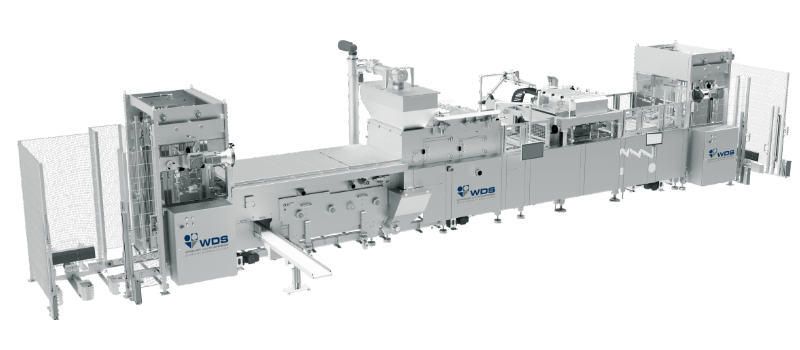
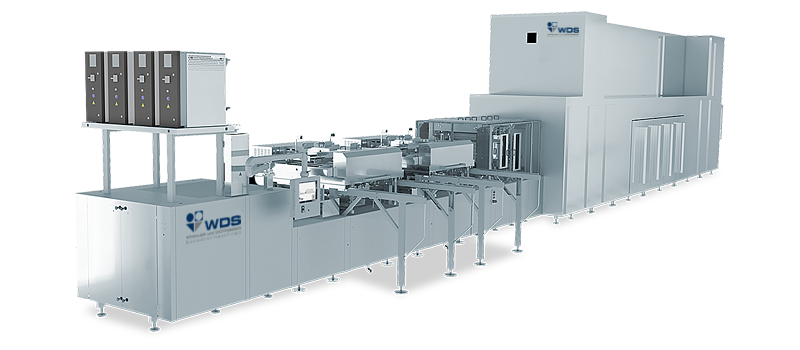
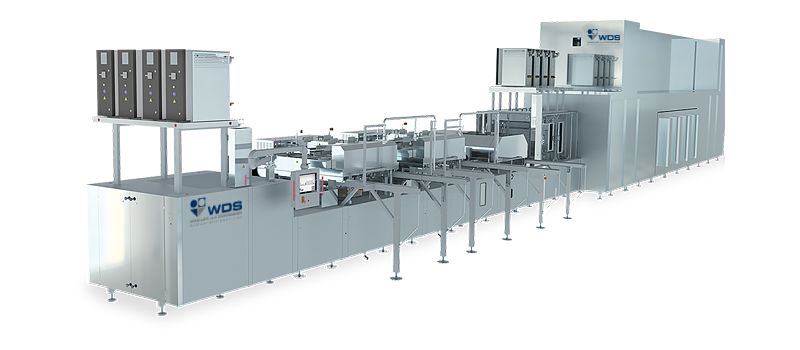
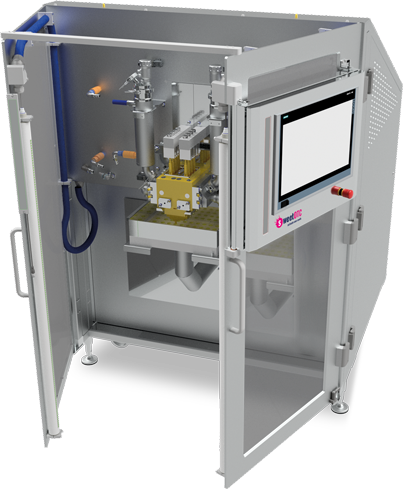

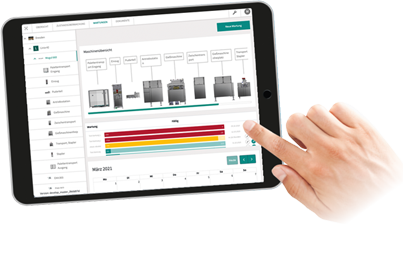
 Deutsch
Deutsch  English
English  Русский
Русский